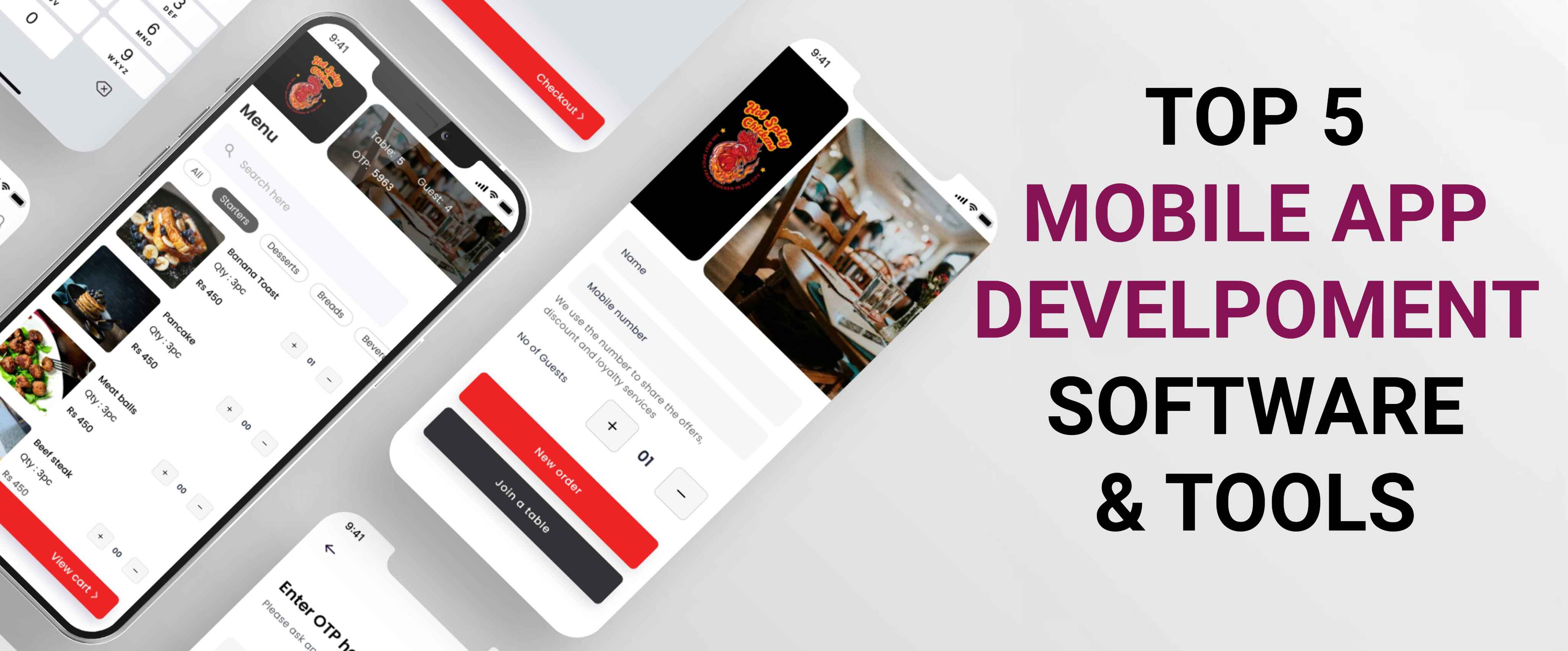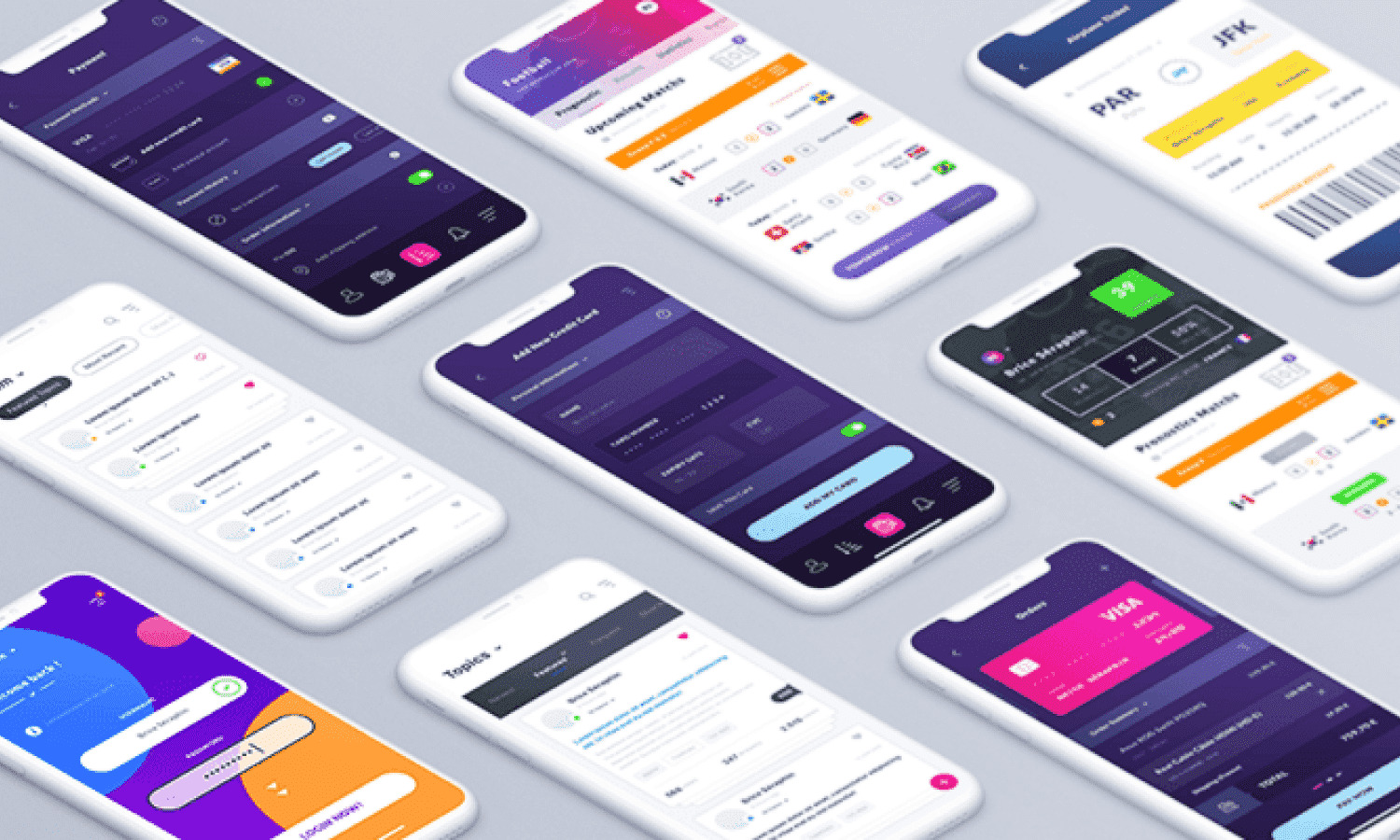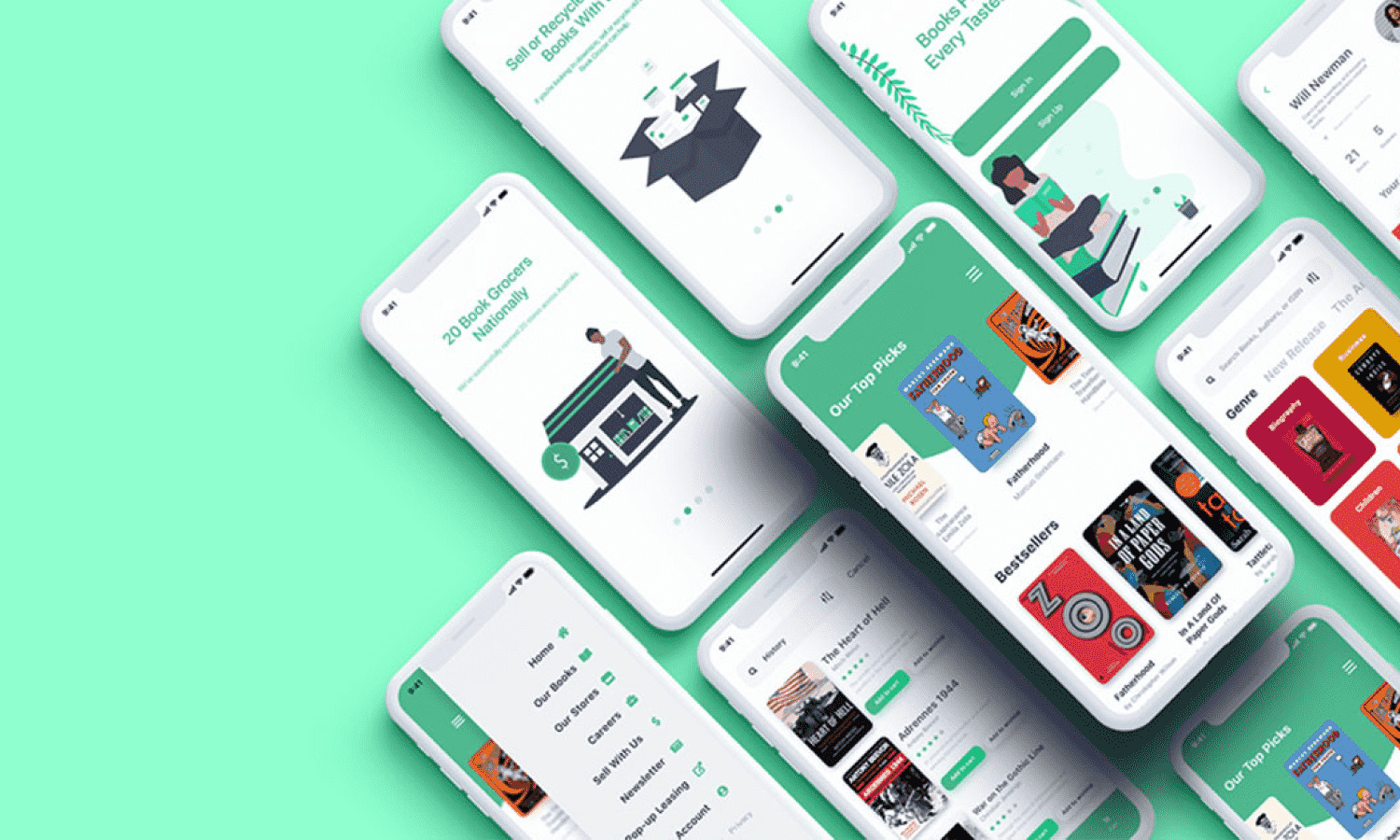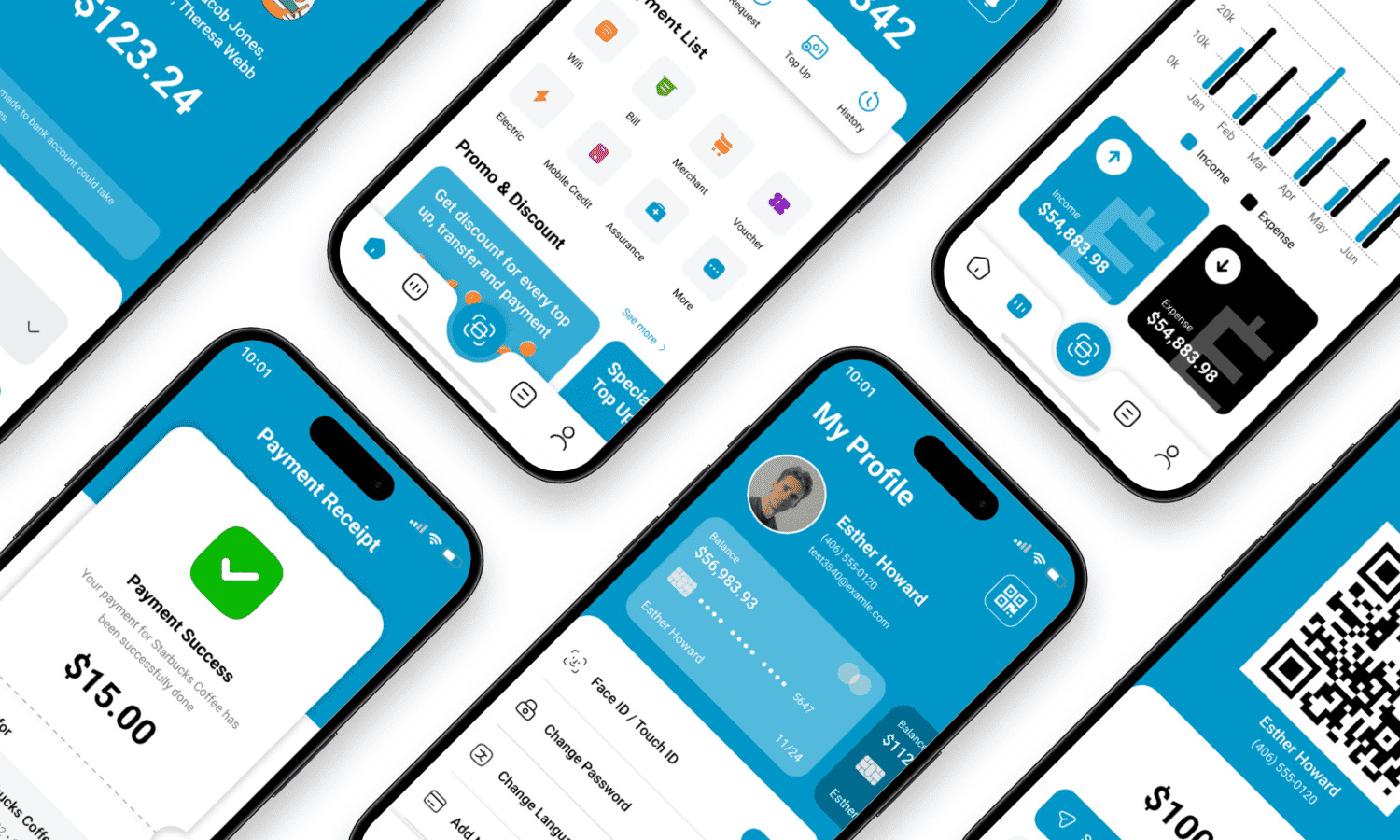Top 5 Mobile App Development Software and Tools

With the mobile app development sectors experiencing rapid growth, mobile app development technologies have witnessed a significant surge. This growth encompasses various areas, including hybrid app development, native app development, cross-platform app development, as well as integration of emerging technologies such as artificial intelligence (AI) and blockchain. The landscape of mobile app technologies is continuously evolving, reflecting the dynamic nature of the industry.
What are App Development Tools and Software?
App development tools and software contain a wide array of programs and platforms utilized in crafting, designing, and advancing mobile applications tailored for iOS and Android devices. These tools and software span from integrated development environments (IDEs) such as Xcode and Android Studio to frameworks and libraries like React Native and Xamarin and include testing and debugging tools like Appium and Charles Proxy.
The selection of tools and software hinges on the requirements of the app development endeavor, alongside the developer's proficiency and background.
Now let's look at the best app development tools to help you create cutting-edge applications.
Here are the top 5 tools and software for mobile app development in 2024. Let's dive into the details.
iOS App Development Platform
The iOS platform is based on the Linux kernel which is developed by Google. Here are the top tools and software for the iOS platform:
1. Flutter
Flutter, developed by Google, is a framework for building mobile applications. It's cross-platform, meaning it's used to create apps for Android, iOS, Linux, Mac, and Windows. Flutter utilizes the Dart programming language and employs a reactive programming model, enabling the creation of user interfaces that are highly responsive and perform with excellence.
Features:
- Fast Development With a “hot reload” feature
- Provides customizable and expressive UI with widgets
- Community Supports both iOS and Android


2. Parse
Parse, an alternative mobile app development platform, provides a suite of tools tailored for the creation and administration of iOS mobile applications. Originally created by Parse Inc., it was subsequently acquired by Facebook. Despite Facebook shutting down the platform on January 28, 2017, the Parse open-source server continues to be upheld by the community and is available for self-hosting.
Features:
- SDK for iOS, Android, and JavaScript for seamless integration
- Web-based dashboard facilitating app management and monitoring
- User-friendly API for data storage, retrieval, and user authentication
3. Fabric
Fabric, is a mobile development platform developed by Twitter, offering a range of tools for the creation and supervision of mobile applications. These include Crashlytics for crash reporting, Answers for analytics, and Beta by Crashlytics for distributing beta builds.
Features:
- Real-time crash reporting and identifying the root causes
- Enables Beta by Crashlytics to distribute beta builds to testers
- Can be integrated with other mobile development tools and platforms like Xcode and Android Studio


4. CodeRunner
CodeRunner, is a code editor and development environment for macOS that allows developers to write, test and debug code in various programming languages. The platform is widely used for iOS development and includes a built-in terminal, making running and testing code easy without switching to a separate terminal window.
Features:
- Supports multiple programming languages
- Offers code completion, syntax highlighting, and automatic indentation
- Includes a built-in file and project manager for easy organization and navigation
5. AppCode
Appcode, is a robust integrated development environment (IDE) for iOS, macOS, and Android app development, created by JetBrains. It also supports multiple programming languages such as Swift, Objective-C, C, and C++ and provides a wide range of features that make coding faster and more efficient. AppCode is designed to work seamlessly with Xcode and Android Studio.
Features:
- Detects and fixes errors and suggests code improvements
- It can automatically refactor code for better readability and maintainability
- Offers advanced code completion to reduce typing and improve efficiency

Top 5 Mobile App Development Software and Tools

With the mobile app development sectors experiencing rapid growth, mobile app development technologies have witnessed a significant surge. This growth encompasses various areas, including hybrid app development, native app development, cross-platform app development, as well as integration of emerging technologies such as artificial intelligence (AI) and blockchain. The landscape of mobile app technologies is continuously evolving, reflecting the dynamic nature of the industry.
What are App Development Tools and Software?
App development tools and software contain a wide array of programs and platforms utilized in crafting, designing, and advancing mobile applications tailored for iOS and Android devices. These tools and software span from integrated development environments (IDEs) such as Xcode and Android Studio to frameworks and libraries like React Native and Xamarin and include testing and debugging tools like Appium and Charles Proxy.
The selection of tools and software hinges on the requirements of the app development endeavor, alongside the developer's proficiency and background.
Now let's look at the best app development tools to help you create cutting-edge applications.
Here are the top 5 tools and software for mobile app development in 2024. Let's dive into the details.
iOS App Development Platform
The iOS platform is based on the Linux kernel which is developed by Google. Here are the top tools and software for the iOS platform:
1. Flutter

Flutter, developed by Google, is a framework for building mobile applications. It's cross-platform, meaning it's used to create apps for Android, iOS, Linux, Mac, and Windows. Flutter utilizes the Dart programming language and employs a reactive programming model, enabling the creation of user interfaces that are highly responsive and perform with excellence.
Features:
- Fast Development With a “hot reload” feature
- Provides customizable and expressive UI with widgets
- Community Supports both iOS and Android
2. Parse

Parse, an alternative mobile app development platform, provides a suite of tools tailored for the creation and administration of iOS mobile applications. Originally created by Parse Inc., it was subsequently acquired by Facebook. Despite Facebook shutting down the platform on January 28, 2017, the Parse open-source server continues to be upheld by the community and is available for self-hosting.
Features:
- SDK for iOS, Android, and JavaScript for seamless integration
- Web-based dashboard facilitating app management and monitoring
- User-friendly API for data storage, retrieval, and user authentication
3. Fabric

Fabric, is a mobile development platform developed by Twitter, offering a range of tools for the creation and supervision of mobile applications. These include Crashlytics for crash reporting, Answers for analytics, and Beta by Crashlytics for distributing beta builds.
Features:
- Real-time crash reporting and identifying the root causes
- Enables Beta by Crashlytics to distribute beta builds to testers
- Can be integrated with other mobile development tools and platforms like Xcode and Android Studio
4. CodeRunner

CodeRunner, is a code editor and development environment for macOS that allows developers to write, test and debug code in various programming languages. The platform is widely used for iOS development and includes a built-in terminal, making running and testing code easy without switching to a separate terminal window.
Features:
- Supports multiple programming languages
- Offers code completion, syntax highlighting, and automatic indentation
- Includes a built-in file and project manager for easy organization and navigation
5. AppCode

Appcode, is a robust integrated development environment (IDE) for iOS, macOS, and Android app development, created by JetBrains. It also supports multiple programming languages such as Swift, Objective-C, C, and C++ and provides a wide range of features that make coding faster and more efficient. AppCode is designed to work seamlessly with Xcode and Android Studio.
Features:
- Detects and fixes errors and suggests code improvements
- It can automatically refactor code for better readability and maintainability
- Offers advanced code completion to reduce typing and improve efficiency
